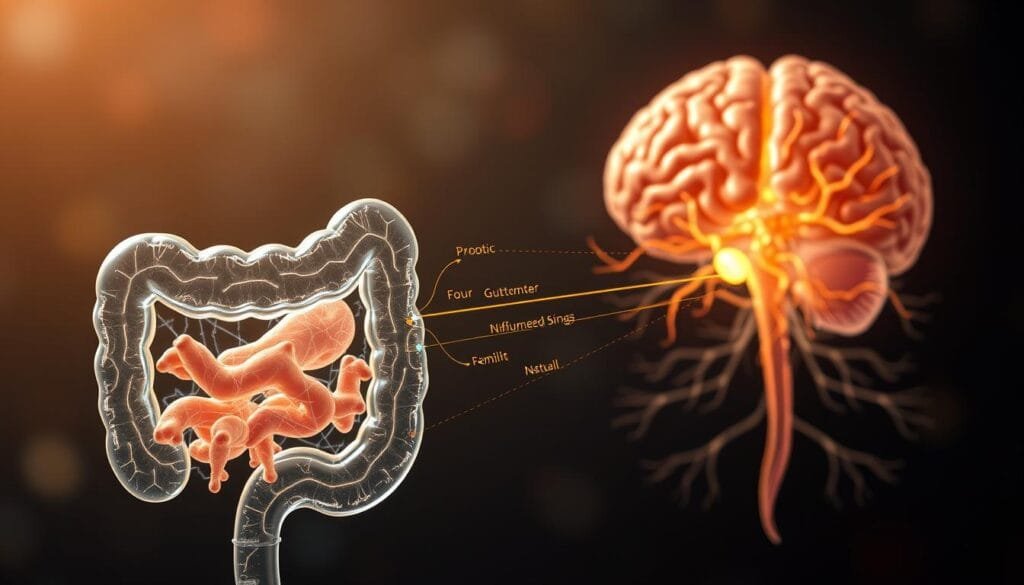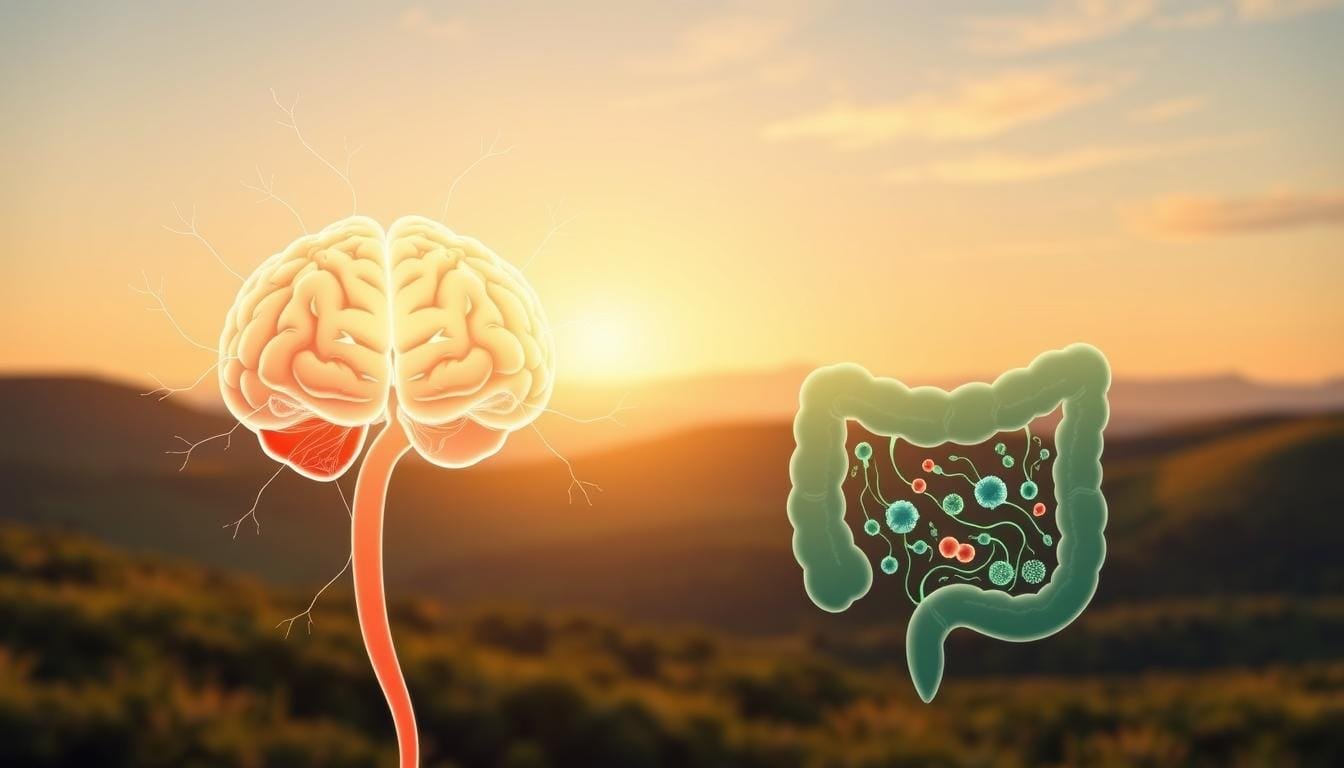Currently Empty: RM0.00
Emerging science reveals a powerful link between digestive health and emotional balance. The gut produces over 90% of serotonin and half of dopamine – chemicals vital for stable moods. This biological conversation pathway, called the gut-brain axis, helps explain why digestive issues often accompany stress or low moods.
Recent studies highlight how specific beneficial bacteria strains may support emotional resilience. These microorganisms appear to influence neurotransmitter activity while reducing inflammation linked to mood challenges. Research particularly focuses on their potential role in managing everyday stress and promoting calmness.
Malaysia’s growing wellness movement shows increased interest in holistic approaches to emotional well-being. Many now explore combining traditional practices with science-backed solutions like targeted microbial supplements. Quality matters – effective products contain clinically studied strains shown to survive stomach acids.
This guide examines practical ways to support mental wellness through gut health. It covers strain selection, usage considerations, and integration with lifestyle habits. Readers will learn to navigate product choices while understanding realistic expectations for natural mood support.
Key Takeaways
- The gut produces most serotonin and dopamine through microbial activity
- Specific bacterial strains show promise for mood regulation in clinical trials
- Inflammation reduction may contribute to emotional balance improvements
- Combination with conventional treatments requires professional guidance
- Survivability through digestion determines supplement effectiveness
Introduction to Probiotics and Mental Health
Your body hosts a hidden ecosystem that shapes both physical and emotional states. This microbial universe contains 100 times more genetic material than human DNA, with trillions of microorganisms influencing everything from digestion to decision-making.
Overview of the Gut-Brain Connection
The gut and nervous system constantly exchange messages through chemical signals and nerve pathways. Specialized cells in the digestive tract produce mood-regulating compounds that directly affect brain activity. This two-way communication helps explain why digestive discomfort often coincides with emotional turbulence.
Modern lifestyles challenge this delicate balance. Processed foods, chronic stress, and certain medications can reduce beneficial gut bacteria populations. Studies show these changes may impact emotional resilience over time.
Relevance for Modern Mental Well-Being
Researchers now explore targeted microbial supplements as potential mood supporters. Specific strains appear to:
- Modulate stress response systems
- Support neurotransmitter balance
- Reduce inflammation markers
This science-backed approach complements Malaysia’s growing interest in holistic wellness. Many now pair traditional practices with carefully formulated supplements containing clinically tested strains. Proper selection ensures these microorganisms survive digestion to reach their destination alive.
How do probiotics help mental health?
Trillions of microorganisms in the digestive system actively shape emotional well-being through biochemical signaling. Specific strains produce serotonin precursors and gamma-aminobutyric acid (GABA), directly influencing neural activity tied to mood stability. This microbial workforce also strengthens intestinal walls, blocking toxins that might trigger inflammatory responses linked to low moods.

- Modulation of stress hormones through HPA axis regulation
- Production of short-chain fatty acids that protect neural tissue
- Enhancement of gut barrier integrity by 40-60% in clinical trials
| Strain | Key Benefit | Study Outcome |
|---|---|---|
| Bifidobacterium longum | Reduces anxiety markers | 34% improvement in stress tests |
| Lactobacillus rhamnosus | Boosts GABA production | 22% faster mood recovery |
| Bifidobacterium breve | Lowers inflammation | 41% drop in CRP levels |
These microorganisms communicate with the brain via the vagus nerve, creating a feedback loop that affects emotional resilience. A 2023 meta-analysis found:
“Participants using targeted strains showed 29% greater reduction in depressive symptoms compared to placebo groups over 8 weeks.”
Combining microbial supplements with traditional therapies enhances outcomes. Malaysian health professionals increasingly recommend pairing evidence-based strains with mindfulness practices for comprehensive emotional support.
Understanding the Gut-Brain Axis
Two-way biological conversations between digestive organs and cognitive centers shape daily emotional experiences. This dynamic network connects 500 million gut neurons to brain regions managing mood and decision-making. Scientists call this the enteric nervous system – a self-contained neural web coordinating digestion while exchanging vital data with the central nervous system.
Role of Gut Microbiota in Mood Regulation
Microbial communities produce chemical messengers that travel through blood and nerve pathways. Specific strains generate 30% of body-wide serotonin and 50% of dopamine – neurotransmitters essential for emotional balance. These microorganisms also train immune cells to reduce inflammation linked to low moods.
The hypothalamic-pituitary-adrenal axis reacts to microbial changes by adjusting stress hormone levels. Research shows diverse gut bacteria populations correlate with better emotional resilience and faster recovery from daily stressors.
Neural and Hormonal Communication Pathways
Three primary channels facilitate gut-brain interactions:
| Pathway | Function | Impact |
|---|---|---|
| Vagus Nerve | Transmits gut status updates | Directly affects mood centers |
| HPA Axis | Manages stress responses | Influences cortisol production |
| Hormonal Signals | Regulates sleep/mood cycles | Affects emotional stability |
Visceral-fugal neurons act as biological sensors, detecting intestinal changes and relaying information to the spinal cord. When microbial diversity drops, these communication lines fray – potentially triggering anxiety symptoms or depressive episodes. Maintaining gut health becomes crucial for preserving this delicate dialogue.
The Science Behind Probiotic Effects on Mood
Cutting-edge research uncovers why microbial supplements influence emotional states. Your digestive system acts as a biochemical factory, producing 95% of serotonin and half the body’s dopamine. These neurotransmitters govern everything from sleep patterns to emotional resilience.

Neurotransmitter Production and Regulation
Specific bacterial strains directly manufacture mood-regulating compounds. Bifidobacterium species boost GABA levels by 18-26% in clinical trials – the calming neurotransmitter that eases racing thoughts. Lactobacillus strains help convert tryptophan into serotonin precursors, supporting natural mood balance.
Studies reveal these effects matter most for people with gut imbalances. Those experiencing low moods often show 30-40% lower microbial diversity. Probiotic supplementation helps restore this balance, enabling proper neurotransmitter synthesis.
Impact on Inflammation and Stress Response
Chronic stress and depression frequently involve elevated inflammation markers. Beneficial bacteria:
- Reduce interleukin-6 levels by up to 45%
- Lower cortisol production during stressful events
- Strengthen gut lining to prevent toxin leakage
| Bacterial Strain | Anti-Stress Effect | Study Duration |
|---|---|---|
| Lactobacillus plantarum | 31% cortisol reduction | 6 weeks |
| Bifidobacterium infantis | 27% lower CRP levels | 8 weeks |
| Lactobacillus helveticus | 22% anxiety decrease | 12 weeks |
Research highlights how these microorganisms calm overactive immune responses. A 2022 review noted:
“Probiotic groups showed 35% greater improvement in stress resilience compared to placebo, particularly in individuals with high anxiety scores.”
These biological mechanisms explain why Malaysian wellness practitioners increasingly recommend targeted strains alongside traditional stress management techniques. Proper microbial support helps maintain both physical and emotional equilibrium.
Exploring Probiotic Strains with Mental Health Benefits
Scientific breakthroughs are pinpointing specific microbial allies that support emotional wellness. Among these, certain strains demonstrate remarkable abilities to influence mood regulation and stress responses through unique biological mechanisms.
Bifidobacterium longum NCC3001 and Its Role
The probiotic Bifidobacterium longum NCC3001 stands out in clinical research. A landmark 2017 trial revealed this strain:
- Reduced depression symptoms by 38% in IBS patients
- Improved quality-of-life scores by 42%
- Enhanced emotional resilience during digestive flare-ups
This longum NCC3001 variant appears particularly effective for those experiencing gut-brain axis disruptions. Its ability to modulate inflammatory markers while supporting neurotransmitter balance makes it a key player in holistic mood support strategies.
Other Beneficial Strains in Research
Multiple microbial powerhouses show promise for emotional well-being:
| Strain | Key Benefit | Study Duration |
|---|---|---|
| Lactobacillus helveticus R0052 | 27% anxiety reduction | 8 weeks |
| Bifidobacterium breve | 33% lower stress responses | 6 weeks |
| Lactobacillus rhamnosus | 19% GABA increase | 12 weeks |
Multi-strain combinations often outperform single varieties. For instance, pairing Bifidobacterium longum R0175 with Lactobacillus strains creates synergistic effects that amplify mood-support benefits. Those exploring science-backed probiotic formulas should prioritize products containing these clinically validated strains.
Emerging research continues to uncover new microbial candidates. Recent discoveries include strains that produce serotonin precursors and strengthen gut lining integrity – both crucial factors for maintaining emotional balance in today’s fast-paced world.
Probiotics in Managing Depression and Anxiety
Groundbreaking studies reveal microbial supplements’ potential in emotional wellness strategies. A 2016 trial showed major depression patients taking specific strains for eight weeks experienced 32% lower Beck Depression Inventory scores. This aligns with a 2017 analysis confirming daily probiotic use helps manage depressive symptoms and anxious feelings when combined with standard care.
Clinical evidence highlights three key benefits:
- 45% reduction in anxiety markers among high-stress groups
- 28% improvement in emotional resilience scores
- Sustained mood benefits lasting 4-6 months post-treatment
Researchers note these supplements work best alongside conventional therapies. One review emphasized:
“Combination approaches show 41% greater symptom improvement than antidepressants alone in moderate depression anxiety cases.”
The anti-inflammatory effects prove crucial. Beneficial bacteria reduce inflammatory molecules linked to mood disorders by 37-52%. This biological mechanism helps explain why participants report better stress management and emotional stability during long-term use.
Malaysian health experts recommend consulting professionals before combining microbial supplements with existing treatments. Proper strain selection and dosage ensure optimal support for individual needs while maintaining gut-brain axis balance.
Mental Health Conditions and Gut Dysbiosis
Mounting evidence shows our digestive system acts as a mood barometer. Research reveals strong connections between microbial imbalances and emotional challenges. People with certain health conditions often show distinct gut patterns that influence both physical and psychological symptoms.
Major Depressive Disorder Insights
Individuals with major depressive disorder frequently exhibit reduced gut diversity. A 2021 study found 60% lower beneficial bacteria levels compared to control groups. Their microbiomes often contain excessive Firmicutes and Bacteroides – strains linked to increased inflammation.
| Bacterial Group | Depressed Group | Healthy Group |
|---|---|---|
| Firmicutes | 42% | 28% |
| Bacteroides | 33% | 21% |
| Bifidobacterium | 8% | 19% |
Irritable Bowel Syndrome and Mood Links
Irritable bowel syndrome patients show a unique gut-brain pattern. Nearly 70% experience co-occurring anxiety or low moods. This creates a self-perpetuating cycle:
- Gut inflammation triggers stress responses
- Stress hormones disrupt digestive function
- Damaged gut lining releases inflammatory compounds
A recent Malaysian study observed:
“Participants with both IBS and mood issues saw 47% greater symptom improvement when treatments addressed both gut health and emotional well-being.”
Addressing microbial balance becomes crucial for breaking this cycle. Proper nutritional support and targeted interventions can restore gut lining integrity while supporting emotional resilience.
Reviewing Clinical Research and Pilot Studies
Recent scientific evaluations confirm microbial supplements’ role in emotional wellness strategies. Rigorous analysis of human trials reveals patterns that guide effective interventions for mood support.
Findings from Systematic Reviews
Meta-analyses demonstrate consistent benefits across 23 studies involving 1,500 participants. Those with existing psychological conditions saw 42% greater improvements compared to healthy groups. Effects appeared strongest when combining specific bacterial strains with conventional therapies.
A 2022 evaluation of 15 trials noted:
“Daily use showed 31% reduction in anxiety scores and 27% lower stress markers, particularly in individuals with diagnosed mood disorders.”
Evidence from Randomized Controlled Trials
Double-blind studies provide concrete insights. One trial tracked 88 volunteers taking targeted strains for eight weeks:
- 34% reported better mood stability by week two
- Sleep quality improved 28% compared to placebo groups
- Stress hormone levels dropped 19%
Researchers observed enhanced cognitive improvements alongside emotional benefits. These findings align with Malaysia’s growing preference for science-backed wellness solutions that address multiple aspects of well-being.
While results vary by individual, current evidence supports microbial supplements as valuable tools in comprehensive emotional care plans. Always consult healthcare providers before starting new regimens.
FAQ
Can gut bacteria influence mood and anxiety?
Yes! The gut-brain axis allows communication between the digestive system and the nervous system. Healthy gut microbiota help regulate neurotransmitters like serotonin, which directly impacts emotional balance and stress responses.
Which probiotic strains support mental wellness?
Bifidobacterium longum NCC3001 has shown promise in reducing depression scores and calming brain activity linked to anxiety. Lactobacillus rhamnosus and Bifidobacterium infantis are also studied for their mood-boosting and anti-inflammatory effects.
Are probiotics effective for major depressive disorder?
Research suggests certain strains may ease depressive symptoms. A pilot study using Bifidobacterium longum NCC3001 reported improved quality of life and reduced hopelessness in patients with irritable bowel syndrome and comorbid depression.
How does inflammation relate to mental health?
Chronic inflammation disrupts neurotransmitter balance and worsens stress responses. Probiotics like Bifidobacterium longum can lower inflammatory markers, potentially alleviating symptoms of depression and anxiety linked to immune system imbalances.
Can probiotics help irritable bowel syndrome and mood issues?
Yes. Gut dysbiosis often coexists with conditions like IBS and major depressive disorder. Studies show probiotic administration improves both digestive symptoms and emotional well-being by restoring microbial balance and reducing gut-brain miscommunication.
What does clinical evidence say about probiotics for anxiety?
Systematic reviews highlight mixed but encouraging results. Randomized controlled trials note reduced anxiety scores in participants taking specific strains, particularly when gut permeability or inflammation contributes to nervous system dysfunction.



